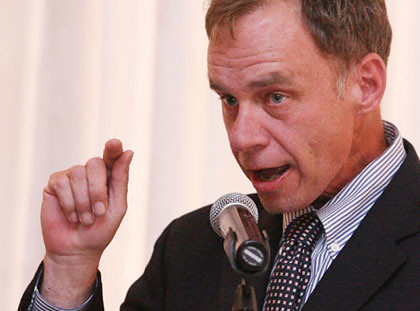
Last week, I was in the midst of finishing off The Narrows, another Michael Connelly Harry Bosch novel that also featured guest appearances by some of his non-Bosch novel characters, most notably FBI Agent Rachel Walling and -- to a degree that I won't reveal because it's spoiler-y -- retired FBI Agent Terry McCaleb. Since then, I've plowed through the rest of The Narrows and finished off Connelly's remaining three Bosch novels, The Closers, Echo Park and The Overlook. I won't go into overly detailed reviews of the three, not because they weren't good, but because I'm more interested in talking about the book I'm reading now.
Of the three, Echo Park was by far the most enjoyable and readable, with the other two serving as functional but not remarkably outstanding Bosch adventures. The Overlook, which was originally published in serialized form in The New York Times Magazine clocked it at barely under 300 pages, which is fairly light for a Connelly book, and read more like it was setting up Bosch's new status quo (new partner, new assignment, old love interest) than really telling an exciting or thrilling adventure. Don't get me wrong -- I enjoyed all three books a great deal. But, if I had to choose which of the three came closest to some of my personal Bosch favorites (Concrete Blonde, Lost Light, A Darkness More Than Night and, to a degree, The Narrows), it'd probably be Echo.
But after finishing The Overlook I found myself without a new Bosch book to read, which allowed me -- for the first time in a few months -- the opportunity to take a detour outside of the crime fiction/detective genre and work out some of the reading muscles that got lazy while I read about forensics and private eyes.
The first book I went to was David Carr's The Night of the Gun. David Carr, as some of you may know, is a columnist for The New York Times. Most importantly, though, Carr is also a recovering crack cocaine addict. The Night of the Gun tells the horrible, gruesome tale of his descent into addiction. The unique part of the memoir, though, is that Carr actually went back and spoke to the people who he interacted with during his time as a junkie failure -- the woman who gave birth to his twin daughters while both of them were daily crack fiends, the well-known comedian who once tried to gouge Carr's eye out because he was nagging the funnyman about a coke debt and the dealer who Carr went to score from while his twin, four-month old daughters waited in the car. In the winter. In Minnesota.

Truly jarring stuff, but Carr doesn't hold anything back in the telling and gives his interview subjects ample room to be critical and brutally honest about the author. And, in the process, you see how Carr himself has changed, but also how he is being changed by the process of re-living his life. Imagine waking up one day and realizing that, no, you're not the nice person you thought you were. Yeah, those two years you don't really remember? Well, you beat up women, drank and drugged to extreme excess, got arrested over a dozen times and failed at five stints in rehab. The story Carr tells, and the journalistic tools he uses to tell them paint a picture of a man who didn't reclaim his life because he's a great person -- although, from what I can tell, he became a better man -- but because of luck, and because he had caring friends and family. I'm only about 200 pages into the book, so I imagine there's more to be revealed. A friend of mine (who lent me the book) said there'll be at least one jaw-dropping moment toward the end. Which is somewhat frightening, because the pages I've already read have left me oftentimes with mouth agape and my eyes wide. I can't recommend this book any more. But enough of that.
What are you reading?






3 comments:
My reading of late has been mostly research related to a project I'd like to start once I'm done with the current screenplay I'm working on. Oh, how easy it is to get sucked into Victorian Britain.
I'll be starting that Pelecanos next time I sit down, though.
Hopefully it doesn't reveal me to be too much of a literary fraud.
I have less than a hundred pages left in Hell's Angels: The Strange and Terrible Saga of the Outlaw Motorcycle Gangs by Hunter S. Thompson. It was his first published book and his first attempt at a non-fiction book. There are passages that read like a lot of his later work but it's interesting to read his reaction to drug excess while living with his wife and child and before Fear and Loathing made him into a cartoon.
Post a Comment